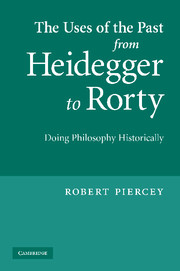Book contents
- Frontmatter
- Contents
- Acknowledgments
- List of abbreviations
- Introduction: The uses of the past
- 1 Doing philosophy historically
- 2 The role of narrative
- 3 Defending the historical thesis
- 4 The critical approach: MacIntyre
- 5 The diagnostic approach: Heidegger
- 6 The synthetic approach: Ricoeur
- Consequences
- References
- Index
2 - The role of narrative
Published online by Cambridge University Press: 31 August 2009
- Frontmatter
- Contents
- Acknowledgments
- List of abbreviations
- Introduction: The uses of the past
- 1 Doing philosophy historically
- 2 The role of narrative
- 3 Defending the historical thesis
- 4 The critical approach: MacIntyre
- 5 The diagnostic approach: Heidegger
- 6 The synthetic approach: Ricoeur
- Consequences
- References
- Index
Summary
In the last chapter, I gave a general account of what is involved in doing philosophy historically. In this chapter, I want to make the account more detailed. The goal of this chapter is to shed further light on how one does philosophy historically: how one goes about assessing a picture by tracing its development over time. The concept of narrative will play an important role here. I argue that doing philosophy historically involves constructing a distinctive kind of narrative about past thought, narratives that help us to see a position or a figure as an instance of a picture. Thus one of the goals of this chapter is to clarify the role that narrative plays in this enterprise, and to explain how it is able to play this role. The notion of “seeing as,” also central to my account, will need to be clarified as well.
Once this has been done, I will turn to a number of further questions about what is involved in doing philosophy historically. I will ask whether the narratives we construct in this enterprise should be considered to be arguments; whether the construction of these narratives is a rational pursuit; and whether it is a pursuit that aims at truth. I will answer all three questions in the affirmative, but I will qualify these answers in important ways.
RORTY, NARRATIVE, AND “SEEING AS”
How does one go about doing philosophy historically? I propose to answer this question by looking at a simple example: Richard Rorty's Philosophy and the Mirror of Nature.
- Type
- Chapter
- Information
- The Uses of the Past from Heidegger to RortyDoing Philosophy Historically, pp. 31 - 57Publisher: Cambridge University PressPrint publication year: 2009



